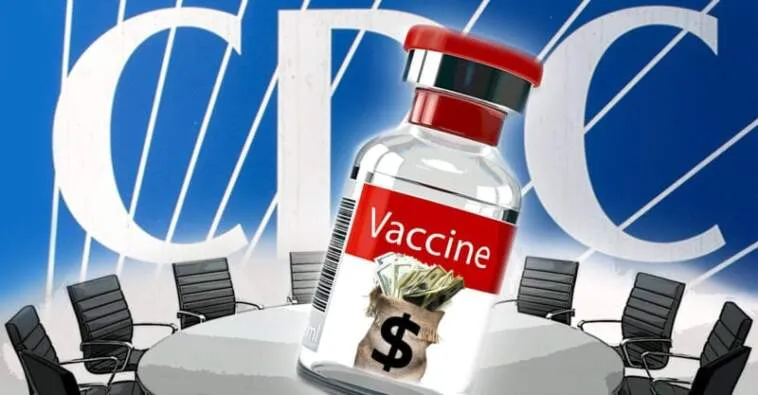(The Defender) Nine new members named to the committee that advises the Centers for Disease Control and Prevention (CDC) on vaccine recommendations have financial ties to pharmaceutical companies or have worked with public health agencies to promote the COVID-19, RSV or HPV vaccines.
The U.S. Department of Health and Human Services (HHS) in mid-February appointed the new members to the Advisory Committee on Immunization Practices (ACIP), which shapes U.S. vaccine policy.
Commenting on the new appointments, Children’s Health Defense (CHD) President Mary Holland said:
“ACIP has long been a rubber stamp for any and all vaccines Big Pharma wants to push. But the brazenness of the HHS-Big Pharma fusion has never been so much on display.
“The only silver lining in this grotesque display is that more and more people are waking up to the reality that ACIP has nothing to do with health and everything to do with profit.”
The ACIP is described as an independent, nonfederal expert body made up of professionals with clinical, scientific and public health expertise. The committee decides which vaccines should be recommended to the public, who should take them and how often — recommendations the CDC typically rubber stamps.
This external advisory committee includes a chair, an executive secretary, and 15 voting members — 14 medical experts and a lay member representing consumers.
It also includes a non-voting body that offers input composed of eight ex officio members from other federal health departments and liaison representatives from health-related professional organizations like the American Association of Pediatrics.
However, when the committee convened last week to make its spring recommendations, it was missing so many voting members that it lacked a quorum. Vacant committee spaces on the “independent” committee had to be temporarily filled by government employees — ex officio members can be sworn in as temporary voting members.
Over the last year, HHS struggled to fill eight vacancies. An additional four members will be needed when existing members’ four-year terms are up at the end of June.
As seats on the committee sat unfilled, industry news sites like StatNews suggested the committee “appears to be atrophying” and Medriva said there is an “unprecedented lack of expertise in the committee.”
When HHS finally announced the new members to fill the vacancies, it was also reported the new members would be filling spots at last week’s meeting. However, they had not yet taken their positions at the time the meeting occurred on Feb. 28-29.
A CDC spokesperson confirmed to The Defender that nine members have been appointed to the committee, including Dr. Helen Keipp Talbot, an infectious diseases researcher at Vanderbilt University who previously served on the committee from 2018 through 2022 and will rejoin the committee to serve as chair.
Members typically are not eligible for reappointment, but in Talbot’s case, the HHS provided a waiver to that existing policy.
In addition to Talbot, four members will begin their tenure immediately upon submission of paperwork. These include Dr. Denise Jamieson, dean of the University of Iowa Carver College of Medicine; Dr. Yvonne Maldonado, a professor of pediatrics at Stanford University; Dr. Robert Schechter, a medical officer with the California Department of Public Health; and Dr. Albert Shaw, an infectious diseases professor at the Yale School of Medicine.
The other appointees will begin on July 1. They include Dr. Edwin Asturias, a pediatric infectious diseases specialist at the Colorado School of Public Health; Noel Brewer, Ph.D., a professor of health behavior at the University of North Carolina; Dr. Helen Chu, an infectious diseases specialist at the University of Washington; and Dr. George Kuchel, a professor of geriatric medicine at the University of Connecticut.
All nine appointees will serve four-year terms.
“Stringent measures and rigorous screening” are reportedly used to avoid the committee members having “real or apparent” conflicts of interest.
However, all of the new appointees except for the public member have received grant funding or consulting fees from major pharmaceutical companies, including vaccine makers like Pfizer, Moderna and Merck, or have worked for HHS or on recent HHS grants developing or testing vaccines or investigating how to improve vaccine uptake.
Many of them have been key public advocates for the COVID-19, respiratory syncytial virus (RSV) and human papillomavirus (HPV) vaccines, crafting and promoting the CDC’s message in the media and in the clinic.
Several have sat, sometimes together, on other vaccine advisory committees for the World Health Organization (WHO), the state of California, and The Lancet, among others.
What constitutes a conflict of interest?
The committee’s policies and procedures document, updated in 2022, defines a “conflict of interest” for committee members.
According to the ACIP policies, while members are actively on the committee, neither they nor their immediate families can be employed by or hold stock in a vaccine manufacturer. They cannot receive royalties from a vaccine that is being evaluated by the committee. They cannot act as advisers, consultants or a paid litigation expert to a vaccine manufacturer, or otherwise receive money from a vaccine maker — with exceptions — while they serve on the committee.
The committee’s definition of a conflict of interest doesn’t prohibit members from benefiting financially from HHS grants while on the committee.
It also doesn’t apply to their activities before or after their time on the committee, which is when most potential members have taken money from industry or engaged in vaccine promotion that raises questions about their impartiality.
This narrowly defined conflict of interest differs markedly from how HHS defines conflict of interest in its ethics training for HHS employees. In that training, HHS warns employers that criminal law prohibits them “from participating personally or substantially in an official capacity that would have a direct and predictable defect on your financial interests,” according to a source at the CDC who asked not to be named.
HHS also notes in its training that “appearances matter” and a conflict of interest arises if a reasonable person with knowledge of relevant facts would question someone’s impartiality.
Impartiality is not a requirement for membership on the CDC advisory committee. Members are required only to declare their financial conflicts at each meeting and to recuse themselves where appropriate.
Members may be granted waivers if the committee’s need for their services outweighs the conflict of interest, according to the CDC.
Below are the new appointees, with a summary of their research and their links to Pharma or public health agencies and research that could raise questions about their impartiality.






